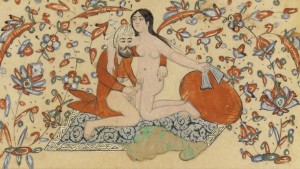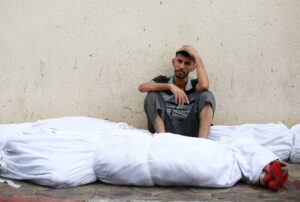Making halal sexy
By Khaled Diab
Though halal sex may sound as logical as kosher bacon, it does make its own sense. Some Muslims are utilising the concept to break the taboo around sex.

Tuesday 12 May 2015
Though Muslims attitudes to sex are as diverse as those found in any other global religious community, the image of contemporary Islam is certainly not sexy. This may explain why a news story about plans to open a halal sex shop in Mecca, Islam’s holiest city in one of its most conservative countries, went viral, among Muslims and non-Muslims alike.
While many assumed the misleading story actually meant that this was a concrete plan, or even that this shop had actually opened its doors, it remains only a wish – some critics claim wishful thinking – expressed by Abdelaziz Aouragh, the Moroccan-Dutch entrepreneur behind El Asira, an erotic e-shop which describes itself as “halal”.
And El Asira is not the only erotic enterprise which carries such an Islamic label, quite a number have popped up in recent years. Over a year ago, Palestinian entrepreneur Ashraf Alkiswani launched Karaz, an e-store and online forum. “It’s not about just sex. It’s about love and the joy of expressing that love,” Alkiswani was quoted as saying at the time. “It’s about trying to build bridges across gaps that separate the husband from the wife by improving sexual harmony.”
Aouragh also described his motivations in similar terms, noting that “if couples don’t take the time to show the love for their partner nor themselves, they won’t be able to reach a deeper sensual, sexual or spiritual connection.”
Unlike Western erotic shops, neither El Asira nor Karaz sell sex toys but market various oils and creams which supposedly enhance foreplay and intensify pleasure during intercourse.
The notion that a sex shop can be “halal” – an Islamic concept similar to “kosher” – had many Muslims and non-Muslims bewildered.
At a certain level, describing erotica as “halal” is simply a branding exercise designed to tap the potentially lucrative and under-exploited erotic market in Muslim countries. “Considering we’re targeting a market of around 1.8 billion people, the potential is huge,” enthused Aouragh in a recent interview about El Asira’s new partnership with German erotica giant Beate Uhse.
But the “halal” label is not just about marketing, it is also about breaking the social taboo surrounding sexual pleasure prevalent in many conservative Muslim communities by demonstrating that sexuality is encouraged, not frowned up, in Islam. “I think Islam is more open [than Muslims are] to sex and issues surrounding sexuality,” Mohammed Abbasi, the co-director of the Association of British Muslims, the UK’s oldest Islamic organization, told me. “Islam is more about what people do in private is their business… whereas Muslims want to get involved in a person’s private life.”
To ensure that their products and sites are “halal”, both Aouragh and Alkiswani sought and gained the approval of numerous Islamic clerics and scholars. To the uninitiated and given the puritanism which pervades some current trends within Islam, this may sound weird and counterintuitive. “Religion or lack of it have nothing to do with sexuality,” Marwa Rakha, a prominent Egyptian relationship and dating expert, told me, noting that the main difference between many self-proclaimed “secular” and “religious” people is their attitude to pre-marital sex.
Historically, Islam possessed a relatively open attitude to sex. In medieval times, many Islamic scholars doubled as sex gurus. They penned countless manuals and guides, including one poetically titled The Perfumed Garden. Perhaps surprisingly, many highlighted the “importance of female fulfillment,” according to Kecia Ali, a professor of religion at Boston University, in her book Sexual Ethics and Islam.
Abu Hamid al-Ghazali, the 11th-century philosopher and mystic whose opus is regarded by many as the “proof of Islam”, wrote widely about the importance of the female orgasm. “The husband should not be preoccupied with his own satisfaction,” the sage advised. “Simultaneity in the moment of orgasm is more delightful to her.” Likewise, the prophet Muhammad himself was reportedly a huge advocate of foreplay, urging his male followers to send “messengers” to their wives in the form of “kisses and caresses”.

This traditional Islamic focus on the carnal partly explains, in the words of Kecia Ali, why “medieval Christian polemics against Islam viewed its sensualism as barbaric in comparison with the purity of Christianity”.
This view of Muslim society continued into the European colonial era. Many Orientalists from the straitlaced, uptight and prudish 19th century were of the view that “everything about the Orient… exuded dangerous sex, threatened hygiene and domestic seemliness with an ‘excessive freedom of intercourse’,” in the words of the late Edward Said, the Palestinian-American scholar who authored the groundbreaking Orientalism.
Paradoxically, this is how some Muslims, especially in the more conservative sections of society, see today’s West, while today’s Westerners, especially those who are unaware of the existence of liberal Muslims, often see Muslim societies as sexually repressed. While this is partly due to actual changes, such as the rise of political Islam and the setbacks endured by secularism, it is also a factor of the centuries-old tendency of Islam and Christendom (the West) to see each other as diametrically opposed, despite their enormous similarities.
Around the world, many Muslims are pushing back against the conservative and sexually repressive interpretation of their faith. “I think more Muslims are becoming more mature and open in their attitudes to sexuality, but at the same time there is a backlash from the more conservative sections of Muslims,” says Abbasi.
For instance, in Egypt, while many young people became more open and assertive about issues relating to sex, Salafists set up vigilante “morality” patrols in some parts of the country, which locals often defied robustly.
Islamic history, scripture and legal texts have become a major battleground between liberals and conservatives for the body, heart and soul of Islam. However, while helpful at certain levels, attempts to find an “authentic” version of Islam which is progressive enough to fit with modern norms is, like with other religious traditions, also problematic.
“The discourse of Islamic authenticity has had a stifling effect on intra-Muslim debates about sex and sexuality,” writes Kecia Ali, especially when it comes to sex outside of marriage, gender equality and homosexuality.
One side-effect of the reluctance to bring sex out of the closet is that many Muslims are left to their own devices, and must engage in a process of oft-discreet self-education. In addition to familial disinclination, there is also the poor quality of sex education in numerous Arab and Muslim countries.
“Education and awareness are weak in general in Egypt and many other Arab/Muslim societies,” explains Rakha. “Those in charge of the education process do not want generations of knowledgeable and curious children, teens, and adults… How can you control a population that understands its rights and freedoms?”
Rakha believes that, like charity, sexual awareness and maturity must begin at home. “The revolution has to come from the core of every family – otherwise it is not happening,” she maintains.
However, despite the existence of a rising number of open-minded families, many parents are unlikely to want to cede control of their offsprings’ love lives, either because this is what tradition demands or because governing access to sex is a powerful weapon of control. “Most families want their children virgins until they get married,” observes Rakha. “To fulfill this beautiful dream, they will minimize sexual education and awareness, lest the sex dragons awaken and ruin the plan.”
Some young Egyptians are rejecting these restrictions, but many do so behind their families’ backs. “They revolt in secrecy, adding a new number each second to the hypocritical population,” says Rakha.
But not everyone is revolting in secret, with some young people, intellectuals and activists openly calling for a sexual revolution. In Egypt, for instance, a vanguard of women intent on seizing their rights is playing a prominent role in this awakening, whether they are combating sexual harassment, insisting on dressing as they please in public, rejecting the hijab, fighting the stigma of being single, and even choosing to live on their own.
____
Follow Khaled Diab on Twitter.
This article first appeared in Haaretz on 4 May 2015.



So, now we know….
Believe me… Whatever floats someone’s boat is the last thing on my mind!